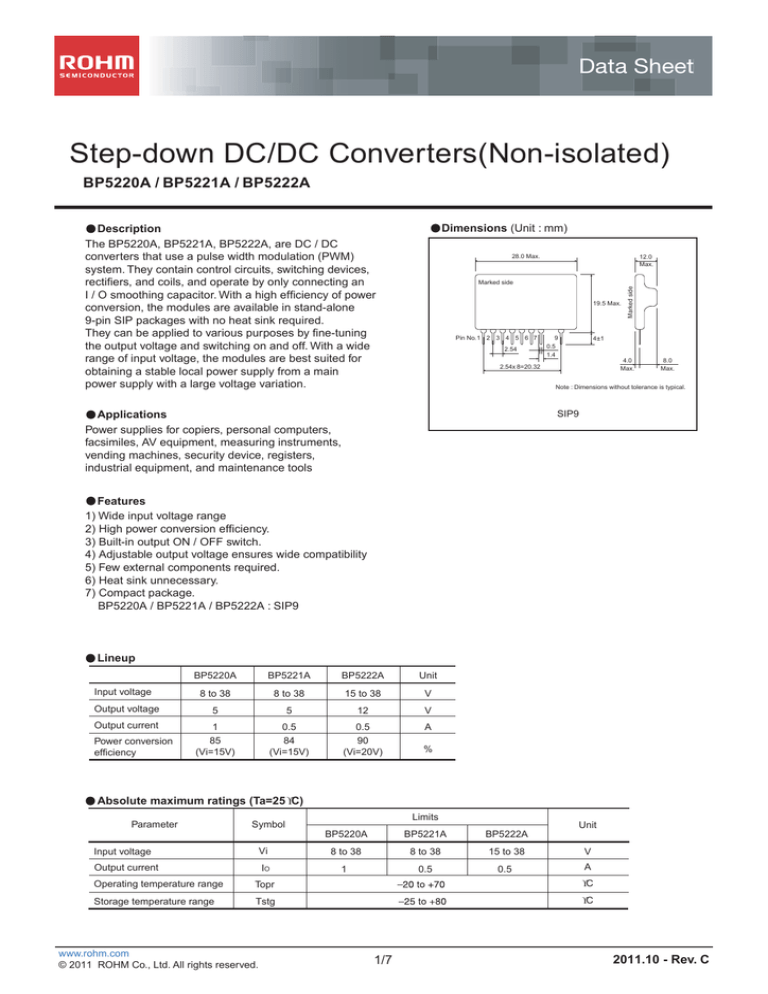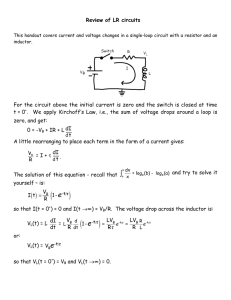
Data Sheet
Step-down DC/DC Converters(Non-isolated)
BP5220A / BP5221A / BP5222A
Dimensions (Unit : mm)
Description
The BP5220A, BP5221A, BP5222A, are DC / DC
converters that use a pulse width modulation (PWM)
system. They contain control circuits, switching devices,
rectifiers, and coils, and operate by only connecting an
I / O smoothing capacitor. With a high efficiency of power
conversion, the modules are available in stand-alone
9-pin SIP packages with no heat sink required.
They can be applied to various purposes by fine-tuning
the output voltage and switching on and off. With a wide
range of input voltage, the modules are best suited for
obtaining a stable local power supply from a main
power supply with a large voltage variation.
28.0 Max.
12.0
Max.
19.5 Max.
Pin No. 1 2 3 4 5 6 7
2.54
9
Marked side
Marked side
4±1
0.5
1.4
4.0
Max.
2.54x 8=20.32
8.0
Max.
Note : Dimensions without tolerance is typical.
SIP9
Applications
Power supplies for copiers, personal computers,
facsimiles, AV equipment, measuring instruments,
vending machines, security device, registers,
industrial equipment, and maintenance tools
Features
1) Wide input voltage range
2) High power conversion efficiency.
3) Built-in output ON / OFF switch.
4) Adjustable output voltage ensures wide compatibility
5) Few external components required.
6) Heat sink unnecessary.
7) Compact package.
BP5220A / BP5221A / BP5222A : SIP9
Lineup
Input voltage
BP5220A
BP5221A
BP5222A
Unit
8 to 38
8 to 38
15 to 38
V
Output voltage
5
5
12
V
Output current
1
85
(Vi=15V)
0.5
84
(Vi=15V)
0.5
90
(Vi=20V)
A
Power conversion
efficiency
%
Absolute maximum ratings (Ta=25 °C)
Parameter
Limits
Symbol
Unit
BP5220A
BP5221A
BP5222A
Input voltage
Vi
8 to 38
8 to 38
15 to 38
V
Output current
IO
1
0.5
0.5
A
Operating temperature range
Topr
°C
Storage temperature range
Tstg
°C
www.rohm.com
© 2011 ROHM Co., Ltd. All rights reserved.
1/7
2011.10 - Rev. C
BP5220A/BP5221A/BP5222A
Data Sheet
Block diagram
BP5220A / BP5221A / BP5222A
DRIVE CIRCUIT
POWER
SUPPLY
CIRCUIT
CONTROL CIRCUIT
N. C.
9
N. C.
7
Vi
6
5
4
3
2
1
ADJ
N. C.
CTL
GND
VOUT
FB
Electrical characteristics
BP5220A (Unless otherwise noted : Vi=15V, Io=0.5A, SW=1, Ta=25˚C)
Parameter
Symbol
Min.
Input voltage
Vi
8
Output voltage
VO
4.75
Output current
IO
Typ.
5
Max.
Unit
38
V
5.25
V
1
A
Conditions
Vi<30V
Line regulation
27
80
mV
Vi=8V to 38V
Load regulation
13
80
mV
Io=0.1A to 1A
22
70
mVPP
Output ripple voltage
75
Power conversion efficiency
Switching frequency
fSW
CTL pin ON resistance
RON
CTL pin OFF resistance
ROFF
%
85
Io=1A
kHz
190
4.7
Vo>4.75V
200
Vo<0.1V, SW=2
BP5221A (Unless otherwise noted : Vi=15V, Io=0.25A, SW=1, Ta=25˚C)
Symbol
Min.
Input voltage
Vi
8
Output voltage
VO
4.75
Output current
IO
Parameter
Max.
Unit
38
V
5.25
V
0.5
A
13
50
mV
Vi=8V to 38V
Load regulation
3
50
mV
Io=0.05A to 0.5A
Output ripple voltage
25
70
mVPP
Line regulation
70
Power conversion efficiency
Switching frequency
fSW
CTL pin ON resistance
RON
CTL pin OFF resistance
ROFF
www.rohm.com
© 2011 ROHM Co., Ltd. All rights reserved.
Typ.
5
84
%
190
kHz
4.7
Conditions
Io=1A
Vo>4.75V
Vo<0.1V, SW=2
200
2/7
2011.10 - Rev. C
BP5220A/BP5221A/BP5222A
Data Sheet
BP5222A (Unless otherwise noted : Vi=20V, Io=0.25A, SW=1, Ta=25˚C)
Symbol
Min.
Input voltage
Vi
15
Output voltage
VO
11.2
Output current
IO
Parameter
Typ.
Max.
Unit
38
V
12.8
V
0.5
A
12
Conditions
Line regulation
22
50
mV
Vi=15V to 38V
Load regulation
18
50
mV
Io=0.05A to 0.5A
29
70
mVPP
Output ripple voltage
75
Power conversion efficiency
fSW
Switching frequency
CTL pin ON resistance
RON
CTL pin OFF resistance
ROFF
90
%
190
kHz
Io=0.5A
4.7
Vo>11.2V
Vo<0.1V, SW=2
200
Measurement circuit
BP5220A / BP5221A / BP5222A
9
Input
7
6
5
4
3
2
1
A
A
Output
SW
1
2
+
+
V
f
200k
4.7k
V
f ; Frequency counter
Fig.1
T
Switching frequency=1/T
Output ripple voltage
Please note that output ripple voltage depends on the type and characteristics of the output capacitor.
www.rohm.com
© 2011 ROHM Co., Ltd. All rights reserved.
3/7
2011.10 - Rev. C
BP5220A/BP5221A/BP5222A
Data Sheet
Circuit operation
(1) The basic application examples are shown in Fig.2.
The only external parts required are the input and
output smoothing capacitors.
BP5220A / BP5221A / BP5222A
9
Vi
(2) Switching on and off the output voltage is allowed.
The output can be switched off by making pin 4
open (high impedance). (See Fig.3)
7
6
5
4
3
2
1
VO
Be sure to use fuse for safety.
+
+
(3) Fine adjustment of the output voltage is allowed.
Adjustment of the output voltage can be
performed from pin 6 via the resistor by connecting
the output terminal (pin 2) or GND. (See
application example 3)
Be sure to use fuse for safety.
Fig.2
BP5220A / BP5221A / BP5222A
9
Vi
7
6
5
4
3
2
Output OFF
1
VO
SW
+
+
Fig.3
Application Examples
Application Example 1 : DC / DC converter with protection circuit
BP5220A / BP5221A / BP5222A
Vi
24V
7
6
5
4
3
2
6
1
VO
5V
+
5
OUTPUT VOLTAGE (V)
9
+
120pF
+
COMP.
4
Vi = 24V
3
2
1
BA10393
0
0.2
0.4
0.6
0.8
1.0
1.2
OUTPUT CURRENT (A)
Fig.4
Fig.5
A resistor is used to limit the rise of output at power on. The resistance depends on the input voltage.
This is a standard application. Because the control current fluctuates with variations in circuits and components,
set the control current by adding a sufficient margin to the normal current level.
Application Example 2 : Output ON / OFF control
BP5220A / BP5221A / BP5222A
Be sure to use fuse for safety.
9
7
6
5
4
3
2
1
Vi
VO
+
+
100 F
ON / OFF
470 F
100k
100k
2SC1740
Fig.6
www.rohm.com
© 2011 ROHM Co., Ltd. All rights reserved.
4/7
2011.10 - Rev. C
BP5220A/BP5221A/BP5222A
Data Sheet
Application Example 3 : Output voltage adjustment
(1) When reducing the output voltage
(2) When increasing the output voltage
BP5220A / BP5221A / BP5222A
BP5220A / BP5221A / BP5222A
9
7
6
5
4
3
2
1
9
Vi
+
6
5
4
3
2
1
VO
+
Be sure to use
fuse for safety.
7
Vi
VO
+
100 F
Be sure to use
fuse for safety.
VR
+
470 F
VR
Fig.8
Fig.7
VR value setting equations (The output voltage after adjustment is denoted by Vo.)
(1) When reducing the output voltage
BP5220A / BP5221A
BP5222A
(2) When increasing the output voltage
BP5220A / BP5221A
BP5222A
To maximize performance we recommended the output voltage be
adjusted within ±20% of the output voltage rating. When the output voltage is increased by 20%, for
instance, the minimum input voltage is also increased by 20%.
(Example : When the output voltage is changed from 5V to 6V in the BP5220A, the minimum input voltage
is charged from 8V to 9.6V)
Application Example 4 : Slow start
The slow start circuit mitigates the pulse load on the internal switching transistor when input voltage is applied,
and increases the output voltage gradually by starting the switching operation slowly.
This application is useful for preventing malfunction of an external protection circuit due to rush current,
and can serve as a countermeasure against operation outside the safe operation range.
BP5220A / BP5221A / BP5222A
9
Vi
24V
7
6
5
4
3
2
1
VO
+
100 F
+
Be sure to use
fuse for safety.
470 F
470k
100k
2SC1740R
+
C1
10 F
Fig.9
C1 is a slow-start capacitor for mitigating excessive rush current that flows into the module when the switch is
turned on.
www.rohm.com
© 2011 ROHM Co., Ltd. All rights reserved.
5/7
2011.10 - Rev. C
BP5220A/BP5221A/BP5222A
Data Sheet
Operation notes
(1) No circuit is installed in the modules to protect against excessive output currents. Therefore, take physical
safety measures such as using a fuse if short-circuit loading is probable.
(2) The output current should be reduced according to an increase in the input voltage or ambient temperature.
Use the modules within the derating curve range.
(3) A large rush current may flow in the module when the input voltage is applied or the output ON / OFF is
controlled with pin 4 without a capacitor such as C1 in application 4. Operating within the safe operation
ranges shown in Fig.12, 15, and 18.
The safe operation range is determined by the safe operation range of the internal switching transistor.
The amount of rush current depends on the output impedance of the input power supply and capacitors
connected to the module outputs. The pulse load on the internal switching transistor at the start of operation
can be reduced by using the protection circuit in application 1 or the slow start circuit in application 4.
(4) Pins 5 and 7 are not connected.
(5) A smoothing electrolytic capacitor is necessary for I/O external components. Please use a capacitor equivalent
to the recommended one.
(6) Please put an I/O smoothing capacitor near the module. Output ripple voltage may be larger or output voltage
may not be stable.
Electrical Characteristics Curves
BP5220A
1200
20
100
OUTPUT CURRENT : I O (mA)
1000
Vi=34V
Vi=23V
80
Vi=8 to 15V
Vi=38V
Vi=25V
800
Vi=30V
Vi=38V
OUTPUT CURRENT INTO PIN9 (A)
Vi=8V
60
600
40
400
20
200
0
25
50
70
100
120
0
AMBIENT TEMPERATURE : Ta( °C)
200
400
600
800
5
3
2
0.5
0.3 Tc=25°C
SINGLE PULSE
0.2
2
3
5
10
20 30
50
VOLTAGE BETWEEN PIN2 AND PIN9 (V)
OUTPUT CURRENT : I O (mA)
Fig.10 Derating curve
Pw=1ms
1
0.1
1
1000
Pw=0.2ms
10
Fig.12 Safety operation range
Fig.11 Efficiency
BP5221A
10
100
OUTPUT CURRENT INTO PIN9 (A)
0.6
OUTPUT CURRENT : I O (mA)
Vi=8V
0.5
Vi=8 to 15V
80
Vi=23V
60
Vi=38V
Vi=30 to 38V
0.4
0.3
40
0.2
20
0.1
0
25
50
70
100
120
0
0.1
0.2
0.3
0.4
0.5
4.5A
2.2A
Pw=1ms
Pw=10ms
1
Tc=25°C
SINGLE PULSE
0.1
1
10
100
AMBIENT TEMPERATURE : Ta( °C)
OUTPUT CURRENT : I O (A)
VOLTAGE BETWEEN PIN2 AND PIN9 (V)
Fig.13 Derating curve
Fig.14 Efficiency
Fig.15 Safety operation range
www.rohm.com
© 2011 ROHM Co., Ltd. All rights reserved.
6/7
2011.10 - Rev. C
BP5220A/BP5221A/BP5222A
Data Sheet
BP5222A
0.6
100
10
0.5
Vi=15 to 20V
80
Vi=38V
Vi=30V
0.4
OUTPUT CURRENT INTO PIN9 (A)
OUTPUT CURRENT : I O (mA)
Vi=23V
Vi=30V
Vi=38V
60
0.3
40
0.2
20
0.1
0
25
50
70
100
120
0
AMBIENT TEMPERATURE : Ta( °C)
0.1
0.2
0.3
0.4
OUTPUT CURRENT : I O (A)
Fig.16 Derating curve
0.5
4.5A
Pw=1ms
2.2A
Pw=10ms
1
Tc=25°C
SINGLE PULSE
0.1
1
10
100
VOLTAGE BETWEEN PIN2 AND PIN9 (V)
Fig.18 Safety operation range
Fig.17 Efficiency
Pin 9 sink current
BP5220A / BP5221A / BP5222A
9
7
6
5
4
3
2
1
+
+
Voltage difference
between pins 2 and 9
Fig.19 ASO measurement circuit
www.rohm.com
© 2011 ROHM Co., Ltd. All rights reserved.
7/7
2011.10 - Rev. C





